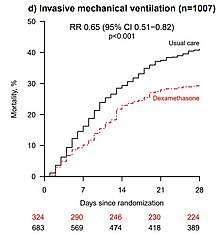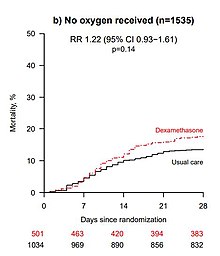RECOVERY Trial
The Randomised Evaluation of COVID-19 therapy (RECOVERY) Trial is a large-enrollment clinical trial of possible treatments for people in the United Kingdom admitted to hospital with severe COVID-19 infection.[1][2][3] As of 17 June 2020, the trial included six proposed interventions: five repurposed drugs and convalescent plasma.[1]

Treatments
The following treatments are allocated at random to hospitalized people with severe COVID-19 infection:[1]
- No additional treatments (i.e., standard hospital care)
- Lopinavir-Ritonavir (an HIV medication)
- Low-dose Dexamethasone (a steroid, which reduces inflammation; closed to new adult entries after positive results)
- Hydroxychloroquine (discontinued in June; shown to be ineffective)[4]
- Azithromycin (an antibiotic)
- Tocilizumab (an anti-inflammatory)
- Convalescent plasma (blood plasma from people who have recovered from COVID-19 and which may contain antibodies against the SARS-CoV-2 virus).
Design
The RECOVERY Trial is a large-scale, randomized controlled trial.[1][5] When people who have been hospitalised with COVID-19 are enrolled in the trial, they are automatically randomized to receive one (or none) of the trial treatments. The primary objective of the trial is to "provide reliable estimates of the effect of study treatments on all-cause mortality at 28 days after first randomisation."[1][5] It is an "open label" study: people receiving the treatment and the attending clinicians both know which treatment is being administered.[1]
It is a multi-arm adaptive clinical trial. New treatments can be added into the trial as it progresses, and other treatment "arms" closed to new enrolment when warranted. [3]
The trial protocol was developed to minimize the administrative load on hospital staff who at the time (March 2020[6]) were facing the prospect of overwhelming numbers of COVID-19 admissions.[7]
Operations
The trial is run by the Nuffield Departments of Public Health and of Medicine at the University of Oxford, and led by Professor Peter Horby. It involves many thousands of health professionals at 175 NHS hospitals in the UK.[4][6]
The trial began in March 2020 and has an estimated duration through June 2021.[5] As of June 2020, the trial had enrolled more than 11,500 COVID-19 participants admitted to hospitals in the UK.[4][3]
Results
Hydroxychloroquine
On 5 June 2020, the trial determined that there was no clinical benefit from use of hydroxychloroquine in people hospitalized with COVID-19.[4]
Dexamethasone

On 22 June 2020, preliminary results were published showing that low-dose dexamethasone treatment reduced the death rate by one third in hospitalized people needing ventilators due to severe COVID-19 infection, and by one fifth in people treated with oxygen therapy. There was no benefit (and the possibility of harm) among people who did not require oxygen.[8]
Impacts
Six days previously, these results had been announced in a news release.[9] A Therapeutic Alert was issued the same day, and all the Chief Medical Officers in the United Kingdom exceptionally recommended an immediate change of UK-wide clinical practice, in advance of publication of any final paper.[10]
Demand for dexamethasone surged after publication of the preprint.[11]
Based on the preliminary, unpublished results of the RECOVERY trial, the US National Institutes of Health COVID-19 Treatment Guidelines Panel recommended dexamethasone in patients with COVID-19 who are on mechanical ventilation or those who require supplemental oxygen, and recommended against dexamethasone for those not requiring supplemental oxygen.[12]
Limitations of dexamethasone result

- John Fletcher, research editor at the BMJ, notes that there are "limitations and causes of concern" in the dexamethasone results.[11]
- Around a third of patients in the trial were still in hospital at the end of the 28-day trial period, so their final outcomes are not known.[11]
- As an immunosuppressive drug, there are fears that dexamethasone could make the illness worse, and prolong the infection in patients where the immune system has not yet overreacted and caused inflammation.[6][13]
- The preprint authors themselves warn that "the results are consistent with possible harm" in patients who did not require oxygen at the time of enrolment.[8] The trial observed a 22% increase in mortality in these patients (rate ratio 1.22 [95% Confidence Interval 0.93 to 1.61]; p=0.14), though this observation may still be due to chance.[8]
- Responding to the publication, the WHO emphasized that dexamethasone should only be used for patients with severe or critical disease, under close clinical supervision, stating that "There is no evidence this drug works for patients with mild disease or as a preventative measure, and it could cause harm."[14]
References
- "RECOVERY Trial". Retrieved 17 June 2020.
- "Coronavirus: Dexamethasone being used to treat NHS patients today". Retrieved 17 June 2020.
- "Biggest COVID-19 trial tests repurposed drugs first". Nature Biotechnology. 11 May 2020. doi:10.1038/s41587-020-0528-x. Retrieved 26 June 2020.
- "No clinical benefit from use of hydroxychloroquine in hospitalised patients with COVID-19". Recovery Trial, Nuffield Department of Population Health, University of Oxford, UK. 2020-06-05. Retrieved 2020-06-07.
- Clinical trial number NCT04381936 for "Randomised Evaluation of COVID-19 Therapy (RECOVERY)" at ClinicalTrials.gov
- Fergus Walsh (20 June 2020). "At last some good news about coronavirus". BBC News. Retrieved 20 June 2020.
- "Randomised evaluation of COVID-19 therapy (RECOVERY) - Trial protocol v6" (PDF). RECOVERY Trial. 14 May 2020. Retrieved 18 June 2020.
- RECOVERY Collaborative Group. "Effect of Dexamethasone in Hospitalized Patients with COVID-19 – Preliminary Report". MedRXiv. Retrieved 23 June 2020.
- "Dexamethasone reduces death in hospitalised patients with severe respiratory complications of COVID-19". University of Oxford. 16 June 2020. Retrieved 16 June 2020.
- "Dexamethasone in COVID-19" (PDF). 16 June 2020. Retrieved 23 June 2020.
- Mahase E (June 2020). "Covid-19: Demand for dexamethasone surges as RECOVERY trial publishes preprint". BMJ. 369: m2512. doi:10.1136/bmj.m2512. PMID 32576548.
- "The National Institutes of Health COVID-19 Treatment Guidelines Panel Provides Recommendations for Dexamethasone in Patients with COVID-19". NIH COVID-19 Treatment Guidelines. National Institutes of Health. 25 June 2020. Retrieved 26 June 2020.
- Roni Caryn Rabin (24 June 2020). "Breakthrough Drug for Covid-19 May Be Risky for Mild Cases". New York Times. Retrieved 25 June 2020.
- "WHO Director-General's opening remarks at the media briefing on COVID-19 - 22 June 2020". World Health Organisation. Retrieved 25 June 2020.